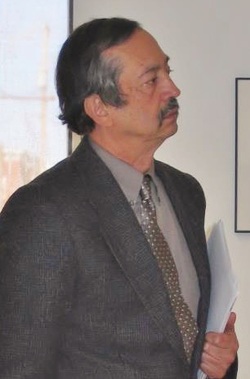
By way of introduction, here are some personal impressions of Erik.
It's not an overstatement to say he excels in all the mental traits most basic to human beings: language use, social ability, empathy, creativity and intelligence. Those of us who have worked with him have watched these in action.
Erik is fluent not only in Spanish, his mother tongue, but also in English -- not just fluent but deeply fluent. His day job since 1987 was English/Spanish and French/Spanish translation for the Translation Bureau of Canada. He has used his translation skills on poetry as well, both his own and others, a formidable task to say the least. His intense focus on language also comes into play in listening to poems read aloud during our events, and in various workshops. He hears poems as if he were reading them.
As much as we value Erik's role at the open mic as its chief photographer, he performs an even greater function due to his sensitivity to social situations. He is quick to see and prevent potential blunders, since his empathy for others is always turned on. I for one have learned an important lesson from Erik, in observing his behaviour with others, that there is nothing more important in life than preventing the hurt of other people, no matter how small it may seem.
Erik is serious about life, and especially about the life of emotions, which has always been central to his poetry.
Born in Santiago, Chile (1944), Erik studied Spanish literature at the Universidad de Chile and participated in the editorial board of 'Orfeo' a prestigious poetry journal, together with his friends from the 'Santiago School', an active poetry group at the time. After Pinochet's military coup, his position as a lecturer terminated, he witnessed the ugly side of the military intervention in his faculty and saw the magazines where he had worked closed, so he decided, as many of his generation, to go into exile. He rushed to the Canadian Embassy in Santiago to present his application to migrate to Canada which in January 1974 started a fast track procedure for Chileans affected by the military regime. He was allowed to emigrate to Canada in February, 1974. He obtained an M.A. in Spanish from Queen's University (Kingston), graduating with a dissertation on Altazor, a long poem by Vicente Huidobro, which is considered one of the greatest achievements of 20th Century Latin American poetry.
In 1985, Ediciones Cordillera published Erik's book of poems, Tequila Sunrise (Ottawa, 1985), and he has been included in several anthologies of Chilean poetry in Canada. Around 2003, he joined the El Dorado Poetry Collective in Ottawa which organized, among other events, an international poetry reading series.
He has published translations and poetry in Canadian and international journals. Presently, Erik has just completed his second book of poems, The Sun Never Sets, a great effort because he felt it was time to start writing in English, not an easy job for someone with a pragmatic but rather limited knowledge of the language at the moment of his arrival. He moved back to London in 2009 where he lives with Violetta, his wife.
Erik Martinez Richards was one of the founding members of London Open Mic Poetry Night. He, Martin Hayter and I, Stan Burfield, drove to a reading in Sarnia in June 2012. We three Londoners read in the open mic at the end of the reading and on the way back wondered why there was a monthly open mic in Sarnia but none in the much larger city of London. The result was the founding of London Open Mic Poetry Night.
 RSS Feed
RSS Feed